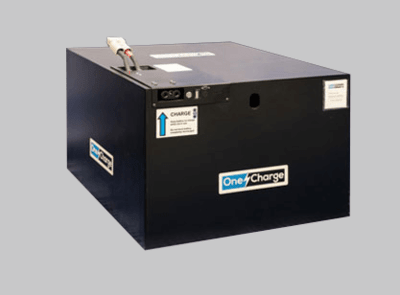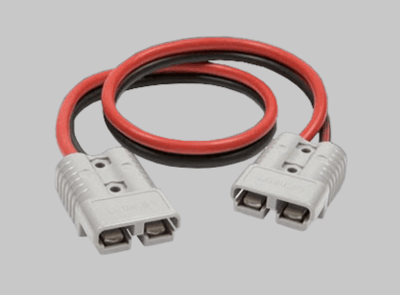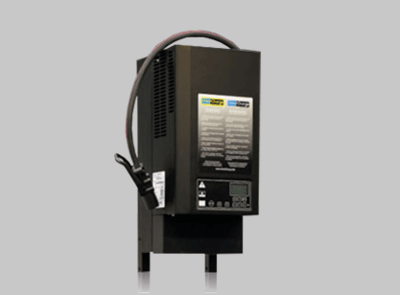Industrial Lithium Batteries

We offer over 600 models of industrial lithium-ion batteries for nearly every make and model of electric industrial trucks.
Accessories and Upgrade Packages

Every OneCharge battery can be upgraded with a number of custom options to meet specific applications. We also offer a range of accessories including forklift battery connectors, battery discharge indicators and battery-computer connection cables.
Chargers for Lithium Forklift Batteries

Get a new OneCharge forklift battery charger, or upgrade and continue to use your own.
Lithium Batteries Advantages
Superior Performance
- Fast lifting and travel speeds at all levels of discharge
- Single battery operation
- Service life >3000 cycles
- Fast charge (2 hours or less)
- No “memory” effect
Safety and Sustainability
- Reduce carbon footprint*
- No hazardous fumes or acid spills*
- Eliminate battery watering*
- Eliminate battery changes at each shift*
Leading-Edge Technology
- Rapidly expanding market
- Big design advantage over the competition
- Battery management system and telemetry
- Wireless capability
- Remote troubleshooting
Reduced Costs
- Lower total cost of ownership*
- 2-3X cycle life*
- Zero daily maintenance and no battery room required*
- Savings on electricity bills*
- Smaller battery, shorter trucks, narrower aisles, more available pallet positions*
- Less wear on lift truck components*
*Compared to a lead-acid battery
Frequently Asked Questions
Today’s choices are either traditional lead-acid or state-of-the-art lithium-ion batteries. The battery you choose depends on the specific application(s) in your operation.
OneCharge Li-ion batteries fully match trucks’ specs and are safer for the truck than lead-acid batteries on different levels:
- No voltage drop during the normal discharge cycle, which can damage truck parts
- Single battery operation means the battery stays in the compartment and eliminates daily shift changes
- Li-on cells are a closed system, so no sulfating of the compartment and surrounding areas on the truck (no acid spills)
- No gassing occurs while charging, so there’s no hydrogen to worry about
This is true whether or not a particular OEM approves of lithium-ion battery use in their vehicles. An OEM will always want to test and formally approve the technology for use in their equipment. However, it is now widely accepted now that a Li-ion power source is overall much better than lead-acid for use in many different types of off-road equipment.
The total cost of ownership of a Li-ion battery, compared to both lead-acid and internal combustion powered trucks, is generally 20–40% lower over the course of 2–4 years.
End users that are 2- to 3-shift operations, that have multiple lifts and multiple batteries per lift, and that are destroying batteries in 3–4 years, are the prime candidates for this technology. There are other reasons, besides lowering your total cost of ownership, to use the technology: it’s better for the equipment, safer for the operator and facility, and can be charged anywhere safely.
Generally speaking, we set up the combinations we provide so they will charge from zero power to full in two hours or less. A typical shift would normally include two 15-minute breaks and one 30-minute lunch. Putting the battery on charge during these times will replenish 50% of the battery capacity. OneCharge also highly recommends opportunity charging whenever the battery is not in use.
You can leave the battery plugged into the charger whenever it’s not being used! The charger will be automatically turned off by the battery management system when the battery is full.
OneCharge lithium-ion batteries do not have a charge memory, or a “memory effect”. There is no set charging procedure required, except to put it on charge whenever it’s not being used.
No
A Li-ion battery that uses LiFePO4 chemistry will experience thermal runaway (catch fire) at 518°F degrees. The OneCharge battery management system will shut down the battery if it reached 150°F degrees. OneCharge emphasizes that our batteries are unlikely to catch fire based on the combination of multiple cells used in the batteries. The LiFePo4 chemistry is 20+year-old technology, widely tested and used, and is the safest chemistry that exists for the lift truck market.
Lithium batteries for lift trucks are regulated as a hazardous material under the U.S. Department of Transportation’s (DOT’s) Hazardous Materials Regulations. OneCharge lithium batteries conform to all applicable requirements and are safe in usage and transportation. Contact us directly for shipping info on any orders you place.
OneCharge currently ships batteries to Canada, Mexico, and South America.
No
No
OneCharge batteries have a separate charging port located next to the battery management system.
All OneCharge Li-ion batteries are WiFi-enabled for online monitoring and troubleshooting.
Yes, but we don’t recommend it. The cells perform better and will last longer with lower depths of discharge, which is why we recommend opportunity charging.
Possibly. Check with your OneCharge representative and/or the OneCharge engineering department regarding the make and model of the charger you want to use. If it can be programmed to work with our battery, we’ll test and approve it for use.
We have already tested and approved most of the common chargers already but we’re open to making as many chargers compatible with our product as possible. Also, be aware that old/existing chargers are typically older technology, less efficient, substantially larger in size, and are much heavier than a new lithium charger. In most cases you’ll want the lithium charger.
Individual Li-ion cells are much lighter and ballast is added to the battery case to match the correct weight needed for the truck to work properly. OneCharge makes custom batteries to match the specs listed on the manufacturers’ data plate of each lift. The final weight can be adjusted to accommodate the use of certain lift truck attachments (paper roll clamp, carton clamp, bale clamp, etc.).
OneCharge offers two different FROST packages that enable Li-ion battery operation in extremely cold conditions (as low as -22°F). The FROST packages will ensure optimum performance without the capacity or run-time losses normally associated with lead-acid.
Currently, OneCharge has a program in place that will accept the battery, disassemble its components, and recycle the metals and electronics. Spent cells will be sent back to the manufacturer for recycling or re-purposing, with the appropriate documentation delivered to the end-user to prove proper disposal.
Usually, 9–12 months, stored with the battery fully charged, then turned off during the storage period. We also recommend that you put the battery on charge at least once every 3 months during the storage period. This feature is especially good for seasonal business or rental fleets.
The traditional lead-acid companies are starting to make lithium versions, but are a bit late to the party because their infrastructure is lead-acid based and well over 100 years old. Estimates show that market penetration is only around 7–10% in the material handling world. No one is officially tracking the sales data yet, so realistically – it’s anybody’s guess. OneCharge is one of the leading lithium batteries manufacturers for lift trucks in North America. We’ve been making lithium batteries for forklifts since 2014.